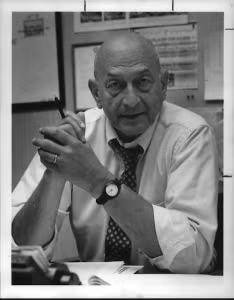Chapter 8 – City Planning
8.4. Influential City Planners
Robert Moses was one of the most influential city planners in American history, remembered for the sheer scale of his accomplishments. Over several decades in New York, he directed massive building projects that reshaped the city’s landscape, including highways, bridges, parks, and large-scale urban renewal efforts. Urban renewal refers to government-led programs to redevelop areas of a city, often by clearing older neighborhoods to make way for new housing, roads, and public facilities.
Moses never held elected office but accumulated power through a series of appointed positions, which gave him unusual control over planning agencies. His work modernized New York’s infrastructure and expanded recreation spaces, though critics contend that many of his projects displaced residents, weakened transit options, and reinforced segregation. His career demonstrates both the ambition and the controversy that can accompany public service in city planning.
Jane Jacobs was a significant figure in modern urban planning. She was an activist who led opposition to Robert Moses’ plan to destroy Washington Square Park in her New York City neighborhood to build two roads through it.

Photo: Washington Square Park in New York City
Jacobs is best known for her book The Life and Death of Great American Cities. In it, she argued that cities work best when they grow at a human scale. She valued walkable streets, mixed-use development where homes, shops, and workplaces exist side by side, and lively neighborhoods built on community life. Jacobs believed planning should come from the bottom up, shaped by the people who live in a place rather than imposed by distant officials. Her ideas shifted city planning toward preserving neighborhood character and supporting vibrant communities that serve residents’ everyday needs..
This video introduces you to Jane Jacobs, her famous book The Death and Life of Great American Cities, her conflict with New York’s impactful planner Robert Moses, and her own impact on the field.
YouTube URL: https://www.youtube.com/watch?v=gaBjXN84MnA
Duration: 11:51
Norm Krumholz introduced the concept of equity planning, which focuses on ensuring that city planning processes address the needs of underrepresented and disadvantaged communities. Krumholz believed that urban planning should be used as a tool to promote social justice and reduce inequality. During his time as the Director of City Planning in Cleveland, Krumholz implemented policies that prioritized the needs of low-income residents, ensuring that they had a voice in the planning process. His work in Cleveland serves as a powerful example of how equity planning can be used to create more just and inclusive cities, where all residents have access to the resources and opportunities they need to thrive.

Above: Norm Krumholz later taught as a professor at Cleveland State University.
Brent Toderian is a leading urban planner known for his innovative approaches to city planning, sometimes called Vancouverism. He was very much influenced by Jane Jacobs. Based in Vancouver, Canada, Toderian has significantly influenced the city’s development, particularly in areas such as walkable communities and mixed-use development. Mixed-use development is a planning approach that combines different types of land uses—such as housing, retail, offices, and public spaces—within the same area or even the same building. The goal is to create lively neighborhoods where people can live, work, shop, and gather in close proximity, reducing the need for long commutes and encouraging walkability. Through his consultancy, Toderian UrbanWorks, he continues to guide cities worldwide in developing vibrant, resilient, and people-centered urban environments. His work serves as a modern example of how city planning can improve the quality of life for urban residents.

